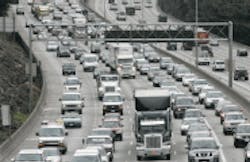“The success of the stimulus in saving countless construction jobs will have been in vain if its sequel is underinvestment in our roads, bridges and transit systems.” –Stephen Sandherr, CEO of the Associated General Contractors of America
Federal funding is dropping for highways and transit systems – not surprising, given that people are driving significantly less, thus consuming less fuel, and thus reducing the overall amount of fuel taxes being collected expressly for investment in transportation infrastructure.
However, the question we need to ask – and to answer – is this: does it matter? If the amount of money available to pay maintenance and expansion of transportation infrastructure is falling, do we seek ways to increase it? Or do we cut back on infrastructure to adjust to available monies?
This is the fundamental issue: Building and maintaining highways, roads, bridges, and transit systems are expensive – and getting more so every year. But can we accept more highway congestion, more delays in travel times and freight delivery times, more expense in terms of vehicle maintenance that arises from driving on poor roads?
According to research released today by the Associated General Contractors of America (AGC), federal investments in highways and transit systems are expected to decline by over $15 billion in 2010 compared to 2009. An estimated 19.3% drop in federal formula and stimulus funding for transportation projects next year is also likely to force over 430,000 layoffs throughout the economy, the association added.
According to the AGC’s analysis, the federal government invested $78.6 billion in road and transit construction projects in 2009. That funding included $51 billion in regular federal transportation funding and $27.6 billion in stimulus funding. Next year, however, federal funding for highway and transit construction will only total $63.4 billion, $9.8 billion of which will come from the remaining stimulus transportation funds, and the rest from regular transportation funding, the association noted.
Non-stimulus federal transportation funds are stuck at near current levels because Congress has failed to pass a six-year surface transportation bill to replace legislation that expired at the end of September, added Stephen Sandherr, AGC’s CEO. That leaves transportation funding at levels well below what multiple, independent, bipartisan commissions estimate are needed to keep pace with the nation’s transportation infrastructure needs, he stressed, and could affect hundreds of thousands of jobs.
“Increasing transportation funding will save countless jobs and provide our economy with a foundation for long-term growth,” Sandherr said. “Boosting transportation investments will keep thousands of construction workers employed at a time when our economy can scarcely afford more layoffs,” noting that the construction unemployment rate is already at 18.7%.
A study conducted for the association by George Mason University Professor Stephen Fuller found that every billion dollars invested in infrastructure projects creates or sustains an estimated 28,500 jobs throughout the economy. Based on that study, the $15.2 billion decline in highway and transit investments next year will result in over 430,000 layoffs throughout the economy, AGC projected.
OK, we get it – transportation funding equals jobs, especially for construction firms, which are really hurting right now. But what I think we really need to do is ask ourselves if we can live with a second-class (maybe even third-class) transportation network in the U.S.
Because transportation touches every part of our way of life in the U.S. – indeed, for that matter, it affects the way the human world functions. It’s how we move people, food, goods of all shapes and sizes, from one place to another. Every medical emergency relies on roads, for a traffic jam, too narrow street, etc., delays that ambulance and critical lifesaving technology from arriving at your doorstep.
A natural disaster occurs somewhere in our country, and relief supplies get sent in – largely by roads and railroads, for planes can only carry so much – and if the runways are closed, no planes are getting it. Every day, we hop in our cars without so much as a second thought ad we race off to school, work, the grocery store, grandma’s for the holidays, vacations, you name it. All of this made possible by those long strips of asphalt and concrete connecting out neighborhoods, towns, cities and states.
Some environmentalists decry transportation and its impact on air quality, but I believe there’s another side to that story. We humans are able to live in urban communities because food, water, and the stuff of daily life gets transported to us. Without transportation, we’d be forced to live far more spread out, impacting the environment more broadly. With trucks to tend electrical transmission lines, without deliveries of home heating oil, maybe we revert to burning wood for warmth … and a whole lot of forests might disappear as a result.
So before we poo-poo the call for more transportation funding, maybe we should ask ourselves what we’d be willing to put up with if we say no. Are we willing to live at a far slower pace, with more delays, less freedom of movement, and higher costs for goods and services to compensate for such delays? It’s something to think about as the debate over transportation funding rolls on.
